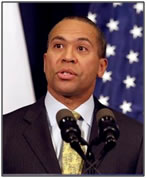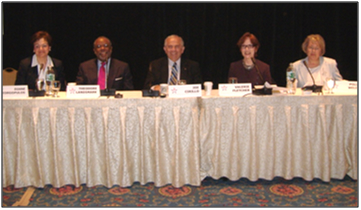|
The Access Board held its annual out-of-town meeting in Boston this year on May 28th. Structured as a town hall meeting, the day-long event featured open forums where members of the public could raise issues or questions of concern. It also included panel presentations on a variety of topics as well as an impromptu visit by Massachusetts Governor Deval Patrick. Board Chair Douglas Anderson opened the program with an update on current Board activities, including its work on new accessibility guidelines.
Open Forums
Members of the public raised a number of topics and concerns in "open mic" sessions held in the morning and afternoon. Several speakers called attention to brick sidewalks, commonly found in the Boston area, and the problems they pose to people with mobility or vision impairments. It was noted that bricks often become uneven or loose over time, making wheelchair travel difficult and posing tripping hazards. Another subject of comment was classroom acoustics and the need for greater awareness and adoption of standards, such as the ANSI/ASA S12.60-2002, to help ensure that noise does not compromise learning by any student. A couple other attendees advised that in complying with ADA standards, pursuit of alternative designs and products as an equivalent facilitation should be made easier and less risky.
 |
|
Governor Deval Patrick |
|
Other concerns raised included access to medical and diagnostic equipment, point-of-sales machines and self-service kiosks, continuing barriers to access in public transit systems, and the need for research on the growing variety of mobility aids now in use. In addition, the Board was urged to issue guidance on the new ADA standards once they are adopted by the Department of Justice, and a speaker voiced concern about accessibility being properly incorporated into the various types of projects funded by the Recovery Act.
Governor Deval Patrick stopped by to welcome the Board to Boston and offered some brief remarks to the audience. "All human beings want an opportunity to contribute to their communities, to their civic lives, to their families, to their livelihood," he noted, "and we want to work with you to assure that, within the resources and opportunities we have in government, we make that happen." Governor Patrick previously served on the Access Board as Assistant Attorney General for Civil Rights in the Clinton Administration.
Panel Discussions
The day's agenda included panel discussions on promoting accessibility in design education, access to museum exhibits, and the work of the Massachusetts Architectural Access Board.
| |
 |
| |
Members of the Design Education Panel included (l-r): Diane Georgopulos, Theodore Landsmark, moderators Joseph Cirillo and Valerie Fletcher, and Polly Welch. |
Panel Discussion on Design Education
A panel discussion moderated by Board Member Joseph Cirillo and Valerie Fletcher, Executive Director of the Institute for Human Centered Design, explored ways to promote education in accessible design, a subject of strong interest to the Board. Panelists included Diane Georgopulos, former president of the Boston Society of Architects, Theodore Landsmark, President of Boston Architectural College, and Polly Welch, a former professor of architecture currently with the Massachusetts Division of Capital Asset Management. Observations made by the panel underscored the need for improving education in this area for both students and practitioners. Landsmark, who previously headed the American Collegiate Schools of Architecture, indicated that accessible or universal design is not a priority in many schools. Discussion centered on strategies for engaging and inspiring students through design competitions, leaders in the field, and programs like the American Institute of Architecture Students' "Freedom by Design" program which gives students practical experience in retrofitting homes for people with disabilities.
Panel Discussion on Museum Exhibit Design
A panel moderated by Board Member Neil Melick presented strategies and best practices for making museum exhibits universally accessible. Panelists Betty Davidson, an expert in the field, and Anna Lindgren-Streicher of the Boston Museum of Science presented information on how tactile and audible features have been integrated into various types of museum exhibits and advised that "multimodal" and "multisensory" approaches are essential for universal access. They also noted challenges posed by various technologies, such as interactive computer screens. Noreen Grice of the Charles Hayden Planetarium described methods used to provide access to planetarium shows, including a discreet captioning system, assistive listening systems, and an in-house process for easily creating tactile pictures to supplement shows. Kevin McGuire of McGuire Associates, Inc. demonstrated a three-in-one handheld device developed by WGBH that provides access to exhibits through captioning, audio description, and assistive listening.
Panel Discussion on the Massachusetts Architectural Access Board
The third panel, which was moderated Access Board members Nancy Starnes and Edward Gee, featured a presentation on the work of the Massachusetts Architectural Access Board (AAB). AAB Chair Donald Lang and Myra Berloff, who serves as the Massachusetts Office on Disability's Designee to the AAB, provided an overview of the AAB which has been responsible for developing and enforcing the Massachusetts access code for almost 40 years. They noted provisions unique to the Massachusetts code and highlighted revisions made in the most recent update. They also indicated that a comprehensive review of the current edition of the code is underway in preparation for the next update. As part of this review, the AAB plans to revisit sections of the code that differ from other accessibility requirements, particularly those of the ADA and the Fair Housing Act.
Other Events
Following the day's program, Valerie Fletcher and the Institute for Human Centered Design hosted a public reception at its offices for attendees of the town hall meeting.
While in Boston, the Board visited WGBH's National Center for Accessible Media, the Carroll Center for the Blind, and Acentech, Inc., an acoustical consulting firm. Board members also examined access features at the Massachusetts State House and the John Adams Courthouse. In addition, Board Member Gary Talbot, who serves as Assistant General Manager for System-Wide Accessibility with the Massachusetts Bay Transportation Authority (MBTA), provided members a tour of several MBTA stations and lines.
The Board sincerely thanks the panelists on the program and meeting attendees for sharing their views, experiences, and expertise. It greatly appreciates the support and assistance provided by Valerie Fletcher and the staff of IHCD as well as the hospitality of its hosts at WGBH, the Carroll Center for the Blind, Acentech, Inc., the State House, the John Adams Courthouse, and the MBTA.
|

